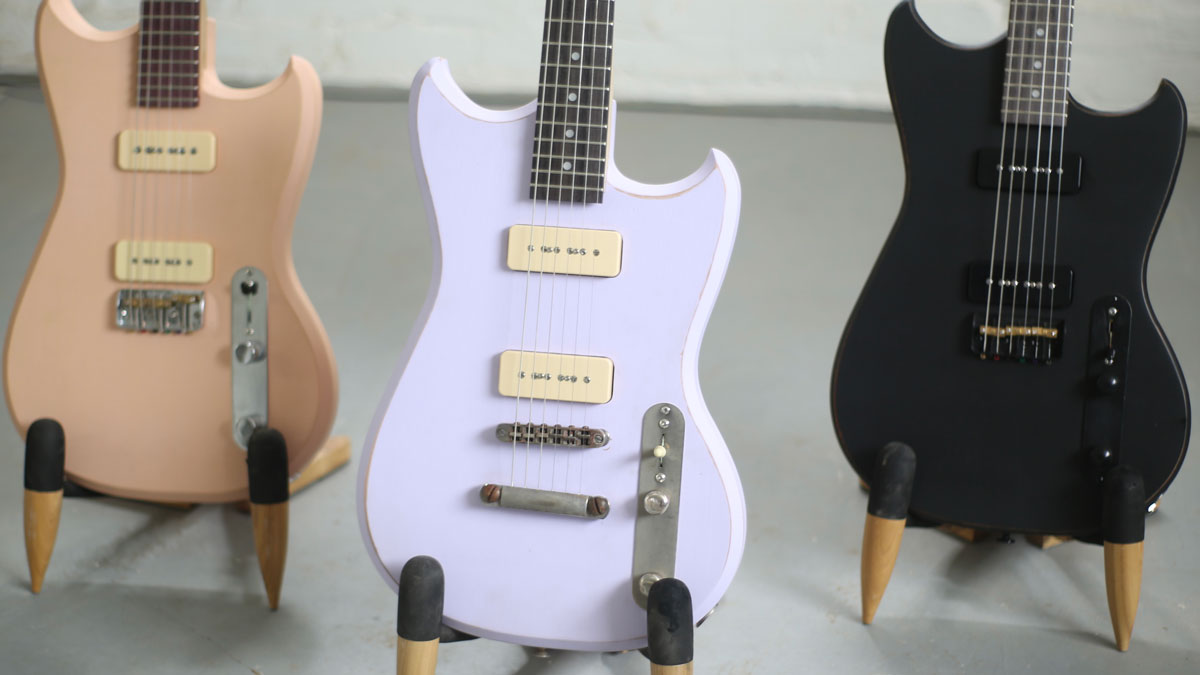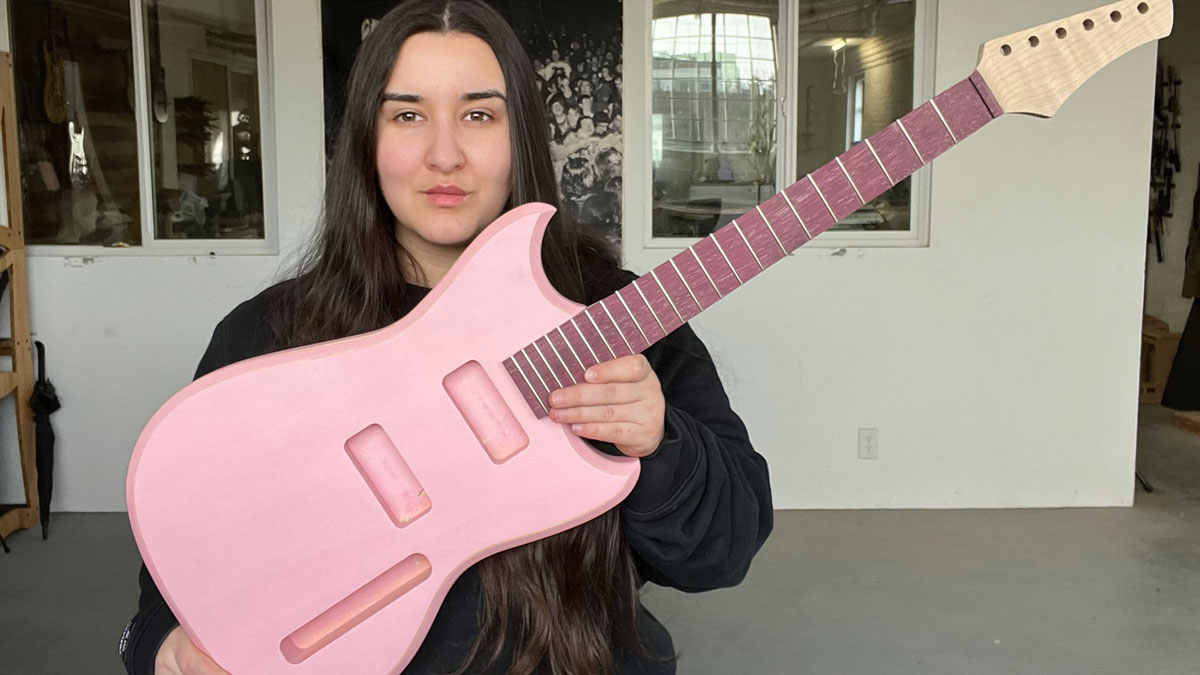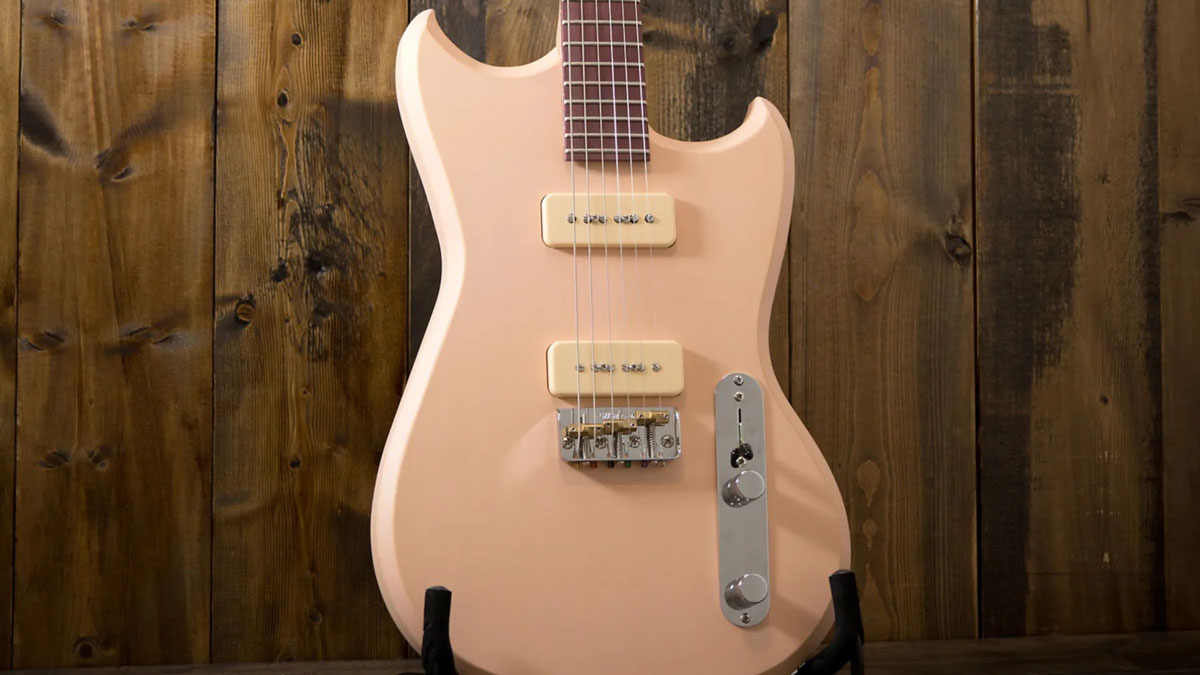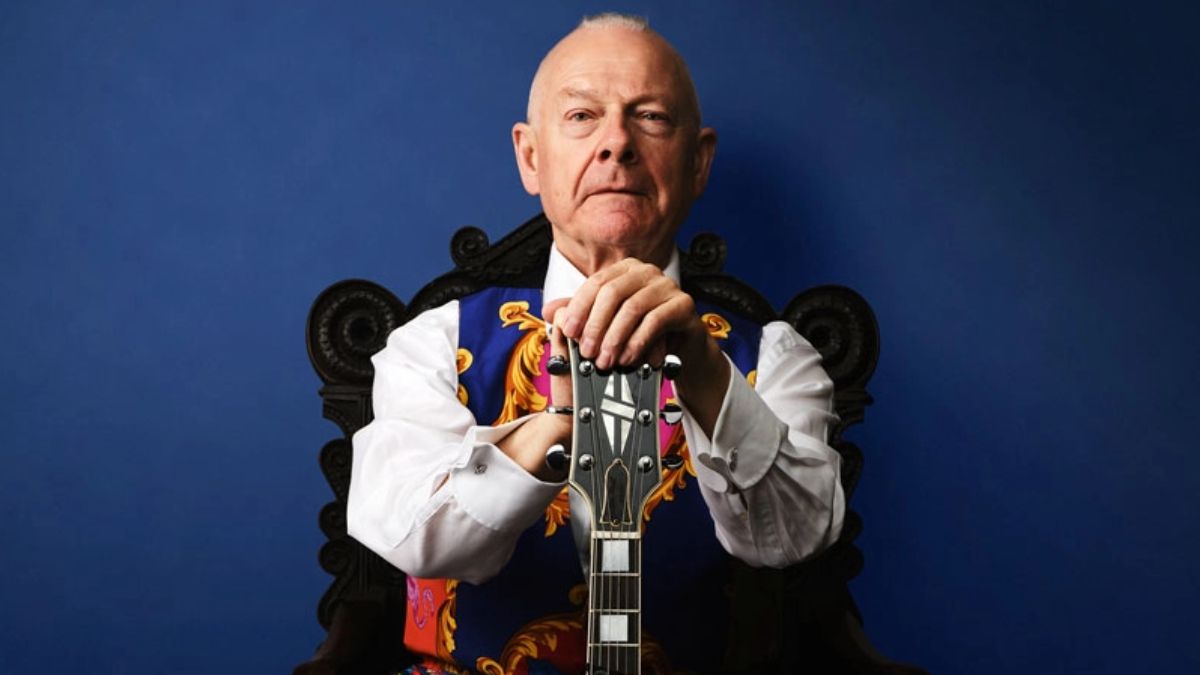Meet Coloma Guitars, the Canadian guitar company that TikTok built
Meredith Coloma studied under esteemed luthier Roger Sadowsky, but it wasn’t until she shared her creations on social media that her guitar design, the Freya, went viral

Meredith Coloma didn’t set out to start her own guitar line, but social media had other plans for her. While the Vancouver, British Columbia-based luthier’s Coloma Guitars began over a decade ago as a repairs shop, the past couple of years have seen the brand pick up significant steam over the founder’s now-signature Freya model.
Though initially conceived as an ornamental piece to hang up at home, once Coloma showed off the pastel offset on social media, guitarists started asking her to build Freyas of their own. Outside of the aesthetics, the interest in Coloma’s instrument also has to do with the hefty followings she’s built as a prolific, behind-the-scenes guitar builder on Instagram and TikTok.
“We sold the majority of our instruments with no paid ads – hundreds of instruments sold just from TikTok,” Coloma explains, adding of her online presence,
“I made a point [to] never [be] too sales-y. My first step was educating people. I filmed myself doing setups and repairs in the repair bunker; I answered people’s questions; I shared tips and tricks. And then when I did have a guitar up and available, I would say, ‘This is an instrument that I built; this is the cost; and here are all the specs.’ From there, people were already invested in me as someone who had given them knowledge. It was much easier to make sales that way.”
The Freya’s surge in popularity has increased Coloma’s workload staggeringly over the past couple of years. When Coloma formally launched the guitar in 2021, she produced a modest nine full builds; last year, that ballooned to 120; by the end of this past March, Coloma had already surpassed last year’s numbers, and is looking to carve out another 300 Freyas by year’s end.
To keep up with the demand, Coloma launched a successful crowdfunding campaign to upgrade tools, hire her first-ever staff members, and replace an old CNC machine that was no longer cutting bodies out accurately. The campaign, which closed at the end of March, surpassed its initial goal of $10,000 CAD by nearly $5,000.
While Coloma has been hand-carving bodies in full the last little while, she’ll pass some of that workload off to the newly ordered CNC. But when it comes to the necks, those will stay in her hands. “I carve all my necks by hand and will continue to [do so], no matter how many guitars we make; we’ll train other people to do that as well. I think that’s the soul of the build, how [the neck] feels in your hand, which is why I want that human aspect.”
All the latest guitar news, interviews, lessons, reviews, deals and more, direct to your inbox!

Luthiery is something that’s kept Coloma connected to other musicians for years, first practicing the craft while out on the road as a teenage fiddle player, and aspiring singer-songwriter.
“[It] was something that I did on the side, because when I was on tour when I was 18-19 years old, I was still too young to hang out at the bar after the gig,” she explains. “So, I would go to the Motel 6 or the back of the van, take a flashlight, and fix all the gear. I’m a pretty responsible person; I never wanted to take chances being the partier. That’s not who I am.”
Later on, Coloma studied music at New York’s Lee Strasberg Institute to develop her skills as a songwriter, and took a job at a clarinet factory to bring in some extra money. Unfortunately, she picked up a life-changing lung disease while working at the factory, and she hasn’t been able to sing the same since. As her performance ambitions were halted, the side gig became the main gig.
“My backup career was luthiery,” Coloma says, before adding, “Sometimes life doesn’t go as planned, but there’s brighter things on the other side.”
Coloma’s guitar-making days kicked off in earnest after sending off an email to respected craft luthier Roger Sadowsky to ask if she had what it took to go pro. When Sadowsky replied to invite her down to his shop in Long Island, Coloma promptly bought a plane ticket and flew out the next day.
“He opened the door and kindly walked me through why my guitars were not great, and I listened,” Coloma explains of how she began her internship at Sadowsky. “My weak spot was fretting, [so] that’s what I did for nine months straight at Sadowsky: I adjusted fretwork. And when I went to start my own business and take repairs, that was a huge help because I could re-fret a guitar in 30 minutes. I can still do it quite efficiently.”
After founding Coloma Guitars, Coloma took on a number of local repairs, while also working on personal violin and guitar builds along the way. Her workshop also doubled as Pacific Wood Lab, a community-forward spot she co-ran with fellow luthier Will McLeod. There, they hosted guitar building classes, and rented bench space to instrument makers that couldn’t afford their own industrial space in Vancouver.
The early months of the COVID pandemic hit Pacific Wood Lab hard, though, with Coloma and McLeod forced to close up and reimburse their students over canceled programs. As Coloma worked from home, her wife asked her if she could put some original guitar builds up on their walls.
Inspired by her favourite Mustang-style offsets, she developed the Freya – named after a Norse goddess whose chariot was pulled by cats (“We’re cat people; I think we fostered 25 cats during Covid”). After posting a few online, fans started reaching out to order their own Freya.
Freya builds often feature alder-based bodies with maple necks, though not always. In part, that’s because the company sources its materials from around the Lower Mainland of British Columbia – sometimes through felled trees from the area, other times by repurposing good condition fir beams from building tear downs.
“B.C. is one of the world’s biggest exporters of tonewood. We have spruce, cedar, alder, maple, walnut. – it’s kind of the mecca of tonewood for North America. So, we have a lot of wood at our disposal, in our backyard,” Coloma explains, adding of how they source materials, “We get wicked windstorms, as a coastal city, so the city will call us if they have a cherry tree that fell over. If it’s big enough, we can come and collect it. You get a chainsaw, a bunch of guys, and a truck.”

Freyas can range from road worn-and-relic’d pastel lilac alder pieces, to elegant natural walnut semi-hollows. Coloma’s entry-level models come equipped with a single P-90 in the bridge position; upper-range models take on tandem P-90s, whether sourced from Seymour Duncan or Canadian pickup makers like MJS.
Beyond six-strings, she’s also built short-scale and full-scale bass models of the Freya. No matter the size, Coloma opted for a bolt-on neck design rather than a neck-through, perhaps inspired by her time as a road musician (“I like bolt-ons because I can take them apart, shove them in a suitcase, and travel”).
While the Freya has caught fire, there is one other axe in Coloma’s arsenal: the SuperStrat-style Dunvegan. Co-designed with McLeod as a full-bore shredder equipped with biting Nazgûls and a wenge fretboard, Coloma says that the Dunvegan has sold reasonably well, but it doesn’t possess “the cult-like following that has seemed to rise [around] the Freya”.
There are not a lot of women in my position, and I wanted to invest in myself so that other people could say, ‘Hey, this woman who happens to be a queer woman – a Latin American woman – can run a custom shop and be successful’
Meredith Coloma
Folks that bought into the crowd-funding campaign were offered incentives ranging from TikTok shoutouts, to road-worn Freyas, to unfinished bodies.
“I think a lot of people that follow me are also guitar tinkerers,” Coloma suggests, with respect to the latter. “You know, they ask me about what finish to use if they’re doing a Partscaster. So, I wanted to give those people something to play with, too. They can take a kit neck – or make their own neck – paint their guitar, and do their own Franken-Freya.”
Coloma is grateful for the experience she acquired at Sadowsky, as well as through some research-and-development projects she picked up through various guitar makers over the years, but is fully psyched to be betting on herself through the growth of Coloma Guitars.
“I was given opportunities at multiple custom shops to come on. Although it is an honour to be considered for those positions, now is the time that I have the energy to fully invest in myself and go forward,” Coloma explains, adding of carving out her own individualistic path, “I found that there are not a lot of women in my position, and I wanted to invest in myself so that other people could say, ‘Hey, this woman who happens to be a queer woman – a Latin American woman – can run a custom shop and be successful.’ I think a lot of people are too afraid to take that step.”
Since the launch of the Freya, Coloma Guitars has ramped up productivity substantially. Coloma is also taking on meetings to distribute the brand worldwide. While it’s exciting to see Coloma Guitars working towards larger-scale manufacturing levels, its owner still strives to maintain the boutique, community-first spirit she’s been building around Vancouver and online.
As Coloma puts it: “We’re kind of the new kids on the block, so there’s endless possibilities at this point, [but] I still want to keep it small and personable.”
- Head to Coloma Guitars for more information.
Gregory Adams is a Vancouver-based arts reporter. From metal legends to emerging pop icons to the best of the basement circuit, he’s interviewed musicians across countless genres for nearly two decades, most recently with Guitar World, Bass Player, Revolver, and more – as well as through his independent newsletter, Gut Feeling. This all still blows his mind. He’s a guitar player, generally bouncing hardcore riffs off his ’52 Tele reissue and a dinged-up SG.

